- Home
- Dante Alighieri
Dante’s Vita Nuova, New Edition: A Translation and an Essay
Dante’s Vita Nuova, New Edition: A Translation and an Essay Read online
Dante’s Vita Nuova:
A Translation and an Essay
Copyright © 1973 by Indiana University Press
All rights reserved
No part of this book may be reproduced or utilized
in any form or by any means, electronic or mechanical,
including photocopying and recording, or by any information storage
and retrieval system, without permission in writing from the publisher.
The Association of American University Presses Resolution on
Permissions constitutes the only exception to this prohibition.
Published in Canada by
Fitzhenry & Whiteside Limited, Don Mills, Ontario
Library of Congress catalog card number: 72-79905
ISBN: 0-253-31620-0 cl. 0-253-20162-4 pa.
Manufactured in the United States of America
10 11 12 00 99
For
Anna Granville Hatcher
who once told me that Scholarship is the
drama between the scholar’s bright idea
and the seductive and implacable evidence.
CONTENTS
Preface
Translator’s Note
The New Life
An Essay on the Vita Nuova
I Patterns
II Aspects
III Growth
Notes on the Essay
PREFACE
The Vita Nuova, one of Dante’s earliest works, is a combination of prose and poetry. There are thirty-one poems inserted into the prose text according to the following arrangement:
I
.......
II
.......
III
sonnet
IV
.......
V
.......
VI
.......
VII
sonnet
VIII
sonnet
sonnet
IX
sonnet
X
sonnet
XI
.......
XII
ballad
XIII
sonnet
XIV
sonnet
XV
sonnet
XVI
sonnet
XVII
.......
XVIII
.......
XIX
canzone
XX
sonnet
XXI
sonnet
XXII
sonnet
sonnet
XXIII
canzone
XXIV
sonnet
XXV
.......
XXVI
sonnet
sonnet
XXVII
reduced
canzone
XXVIII
.......
XXIX
.......
XXX
.......
XXXI
canzone
XXXII
sonnet
XXXIII
unfinished
canzone
XXXIV
sonnet
XXXV
sonnet
XXXVI
sonnet
XXXVII
sonnet
XXXVIII
sonnet
XXXIX
sonnet
XL
sonnet
XLI
sonnet
XLII
........
The originality of the Vita nuova consists not in the mixture of prose and verse (a device used by Boethius in his Philoso-phiae Consolatio and, a century before him, by Martianus Capella), but in the functional relationship between the two: it seems to be a fact that the Vita nuova is the first work of fiction including both prose and poetry, in which the prose serves the purpose not only of offering a continuous narrative but also of explaining the occasion for the composition of each of the poems included.
Also significant is the chronological relationship between the composition of the poems and that of the prose narrative, which reflects the way in which the author has adapted to a new purpose some of his earlier writings. For scholars generally agree that when Dante, some time between 1292 (that is, two years after the death of Beatrice) and 1300, composed the Vita nuova, most, if not all, of the poems that were to appear in the text had already been written. The architecture of the work, then, consists of selected poems arranged in a certain order, with bridges of prose between them, bridges that serve (with the exception of the “essays” represented by Chapters XXV and XXIX) primarily a narrative function: to describe those events in the life of the protagonist, which supposedly inspired the poems. By offering in this way a narrative background, the author was able to make their meaning clearer—or, perhaps, to change their original meaning or purpose.
Thus, the first canzone, “Donne ch’avete inteiletto d’amore,” though its beauty is independent of its position in the work, owes entirely to the preceding narrative its dramatic significance as the proclamation of a totally new attitude adopted by the poet-lover. Again, the poem in Chapter XXVII describing the disequilibrium of the lover’s spiriti caused by the presence of his lady is insignificant in itself, and treats a theme frequently recurring in the book; but the author’s decision to place this familiar theme immediately after Chapter XXVI (a most strategic choice of location, as the reader will come to see) invests it with dynamic overtones which could determine, in a most important way, the message of the Vita nuova itself.
Now, just how much of the narrative prose is fiction we shall never know: we can never be sure that a given poem actually arose from the circumstances related in the preceding prose. A few critics believe that all of the events of the narrative reflect biographical truth; most, fortunately, are more skeptical. But it goes without saying that in reading the Vita nuova we must suspend our skepticism and accept as “true” the events of the narrative. For only by doing so can we perceive the significance that the author attributed to his poems by placing them where he did. And most critics of the Vita nuova seem to be agreed that in interpreting this work as a piece of literature, in seeking to find its message, the reader must try to forget the biographical fact that any given poem may have been written before Dante could know the use he would make of it later on. And no serious critic, if puzzled by the inclusion of a certain poem in the book, or by its position, would dare to brush aside the problem by saying to himself that, after all, Dante had some old poems in his desk drawer that he was determined to use, somehow.
Still, the critic’s knowledge of the earlier existence of the poems does constitute an insidious danger, of which often he may not be aware, making it difficult for him to face squarely the problems that the poems may offer in their new setting. It is this knowledge, I believe, that has prevented critics from studying the individual poems and their position in the work as carefully as they should. It is most important that Dante has chosen to include any particular poem and to place it where he did; it could have appeared somewhere else, or of course, have been omitted. The critic must realize the conclusive importance of Dante’s choices, and he must seek to discern Dante’s intention through very careful analysis.
This point will be stressed more than once in my Essay; in fact, my study differs from others mainly because, whenever a poem is analyzed, it is considered against the background of the narrative as reflecting what happens in time—from the moment the protagonist as a young child meets the child Beatri
ce, to the moment when he, as a grown man, decides that what he has written is unworthy of her.
The earlier edition of my translation of the Vita nuova included an Introduction, which was mainly an interpretation of the significance of the book. In the present volume that Introduction has been replaced by a much longer study, different from the previous attempt at analysis in two important ways. First, of the three chapters of my “Essay,” two are concerned with problems which do not directly involve the moral message of the Vita nuova: the first chapter (“Patterns”) has a rather novel approach, and concerns the structure of the work and the artistic ingredients that go into its making. In the second (“Aspects”) I take up a well-known, much debated problem: the identity or the representational value of the figure called “Love,” who appears in various guises on the stage of the lover’s imagination. It is in the third chapter (“Growth”) that the teaching of Dante’s Vita nuova is investigated, with results that are considerably at variance with the ideas I had previously expressed: indeed, in one important sense, they are radically opposed to them. In this Chapter I seek to explain in considerable detail, and to justify as convincingly as possible, my new convictions about the purpose of this extraordinary little book.
TRANSLATOR’S NOTE
In this translation of the Vita nuova, as in the one I published fifteen years ago, I have avoided the use of rhyme in the poetry, continuing to render the Italian original in English blank verse. My reasons for not submitting to the tyranny of rhyme in translating Dante’s poetry have been presented in the Foreword to my recent translation of the Inferno; there I also expressed my ideas about what faithfulness to the original should mean for the translator of poetry.
It might seem that the problem would be much less difficult for the translator of prose. I should say that it is less complicated, but is, nonetheless, difficult if the original text was composed centuries ago, when the patterns of prose style were quite different from those of our own time. There is no doubt about it: to the reader who goes from modern Italian prose to the prose of the Vita nuova the older style seems stilted and verbose; and the reader always seems to be in the midst of a dependent clause, or to have just escaped from one, or to be about to enter into another. Yet it would be a sacrilege to reduce Dante’s elaborate prose periods to simpler predications. On the other hand, should one offer the reader a translation with sentences that may be tedious to read, and language which will strike him as unnatural? To find a happy compromise is not easy, and this is particularly true of the narrative prose of the Vita nuova. The suggestion of “stuffiness” that would be unavoidable in a translation of a philosophical work such as Dante’s Convivio would certainly be tolerated by all readers, and perhaps even enjoyed. It is less enjoyable in a narrative; and Dante’s narrative style is at times indistinguishable from the expository style of his Convivio. Thus, in Chapter XXII of the Vita nuova, after announcing the death of Beatrice’s father, he continues:
Since such a departure is sorrowful to those who remain and who have been friends of the deceased; and since there is no friendship more intimate than that of a good father for a good child, or of a good child for a good father; and since her father, as is believed by many and is the truth, was exceedingly good—then it is clear that this lady was filled with bitterest sorrow.
Sometimes, it is true, careful study will reveal that what seems at first glance to be unpardonable pedantry was inspired by the deepest artistry. To mention one instance: seven times the city of Florence is designated by the phrase “the above-mentioned city” (la sopradetta cittade); just why this legalistic periphrasis was chosen (and why the city is never called by name) I shall attempt to explain in terms of the message of the Vita nuova itself. But many times the explanation for Dante’s stylistic choices must be sought in certain very personal predilections of the author which are generally not shared by writers of narrative. Surely whatever it was (and this matter will be discussed) that inspired the author of the Vita nuova to attach to most of his poems a minutely precise explanation of their content—thereby anticipating, though for a different purpose, his procedure in the Convivio—helps explain the choice of his prose style in general.
If the reader believes, as he must, that Dante’s prose style, more appropriate to exposition than to narrative, represents a deliberate choice by a man of genius, he will probably appreciate the goal I have set myself: to respect every detail of Dante’s sentence structure as far as it is possible to do so within the limits set by the patterns of English idiom.
The New Life
I
IN MY BOOK OF MEMORY, in the early part where there is little to be read, there comes a chapter with the rubric: Incipit vita nova.1 It is my intention to copy into this little book the words I find written under that heading—if not all of them, at least the essence of their meaning.
II
Nine times already since my birth the heaven of light had circled back to almost the same point, when there appeared before my eyes the now glorious lady of my mind, who was called Beatrice even by those who did not know what her name was. She had been in this life long enough for the heaven of the fixed stars to be able to move a twelfth of a degree to the East in her time; that is, she appeared to me at about the beginning of her ninth year, and I first saw her near the end of my ninth year. She appeared dressed in the most patrician of colors, a subdued and decorous crimson, her robe bound round and adorned in a style suitable to her years. At that very moment, and I speak the truth, the vital spirit, the one that dwells in the most secret chamber of the heart, began to tremble so violently that even the most minute veins of my body were strangely affected; and trembling, it spoke these words: Ecce deus fortior me, qui veniens dominabitur michi.2 At that point the animal spirit, the one abiding in the high chamber to which all the senses bring their perceptions, was stricken with amazement and, speaking directly to the spirits of sight, said these words: Apparuit iam beatitudo vestra3 At that point the natural spirit, the one dwelling in that part where our food is digested, began to weep, and weeping said these words: Heu miser, quia frequenter impeditus ero deinceps!4 Let me say that, from that time on, Love governed my soul, which became immediately devoted to him, and he reigned over me with such assurance and lordship, given him by the power of my imagination, that I could only dedicate myself to fulfilling his every pleasure. Often he commanded me to go and look for this youngest of angels; so, during those early years I often went in search of her, and I found her to be of such natural dignity and worthy of such admiration that the words of the poet Homer suited her perfectly: “She seemed to be the daughter not of a mortal, but of a god.” And though her image, which remained constantly with me, was Love’s assurance of holding me, it was of such a pure quality that it never allowed me to be ruled by Love without the faithful counsel of reason, in all those things where such advice might be profitable. Since to dwell on my passions and actions when I was so young might seem like recounting fantasies, I shall put them aside and, omitting many things that could be copied from the text which is the source of my present words, I shall turn to those written in my memory under more important headings.
III
After so many days had passed that precisely nine years were ending since the appearance, just described, of this most gracious lady, it happened that on the last one of those days the miraculous lady appeared, dressed in purest white, between two ladies of noble bearing both older than she was; and passing along a certain street, she turned her eyes to where I was standing faint-hearted and, with that indescribable graciousness for which today she is rewarded in the eternal life, she greeted me so miraculously that I seemed at that moment to behold the entire range of possible bliss. It was precisely the ninth hour of that day, three o’clock in the afternoon, when her sweet greeting came to me. Since this was the first time her words had ever been directed to me, I became so ecstatic that, like a drunken man, I turned away from everyone and I sought the loneliness of my room, where I beg
an thinking of this most gracious lady and, thinking of her, I fell into a sweet sleep, and a marvelous vision appeared to me. I seemed to see a cloud the color of fire and, in that cloud, a lordly man, frightening to behold, yet he seemed also to be wondrously filled with joy. He spoke and said many things, of which I understood only a few; one was Ego dominus tuus.5 I seemed to see in his arms a sleeping figure, naked but lightly wrapped in a crimson cloth; looking intently at this figure, I recognized the lady of the greeting, the lady who earlier in the day had deigned to greet me. In one hand he seemed to be holding something that was all in flames, and it seemed to me that he said these words: Vide cor tuum.6 And after some time had passed, he seemed to awaken the one who slept, and he forced her cunningly to eat of that burning object in his hand; she ate of it timidly. A short time after this, his happiness gave way to bitterest weeping, and weeping he folded his arms around this lady, and together they seemed to ascend toward the heavens. At that point my drowsy sleep could not bear the anguish that I felt; it was broken and I awoke. At once I began to reflect, and I discovered that the hour at which that vision had appeared to me was the fourth hour of the night; that is, it was exactly the first of the last nine hours of the night. Thinking about what I had seen, I decided to make it known to many of the famous poets of that time. Since just recently I had taught myself the art of writing poetry, I decided to compose a sonnet addressed to all of Love’s faithful subjects; and, requesting them to interpret my vision, I would write them what I had seen in my sleep. And then I began to write this sonnet, which begins: To every captive soul.

 Circles of Hell
Circles of Hell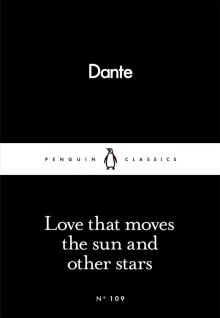 Love That Moves the Sun and Other Stars
Love That Moves the Sun and Other Stars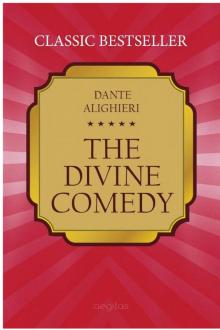 The Divine Comedy
The Divine Comedy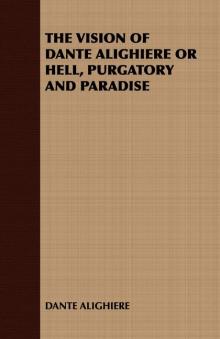 The Vision of Dante Alighiere or Hell, Purgatory and Paradise
The Vision of Dante Alighiere or Hell, Purgatory and Paradise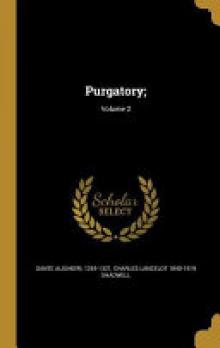 Purgatory
Purgatory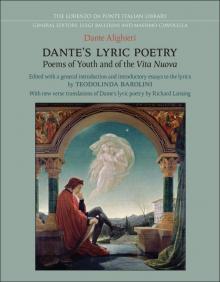 Dante's Lyric Poems (Italian Poetry in Translation)
Dante's Lyric Poems (Italian Poetry in Translation)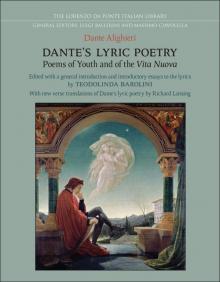 Dante's Lyric Poetry: Poems of Youth and of the 'Vita Nuova'
Dante's Lyric Poetry: Poems of Youth and of the 'Vita Nuova'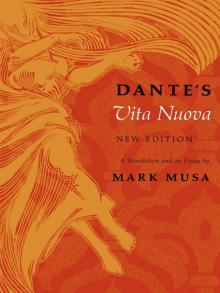 Dante’s Vita Nuova, New Edition: A Translation and an Essay
Dante’s Vita Nuova, New Edition: A Translation and an Essay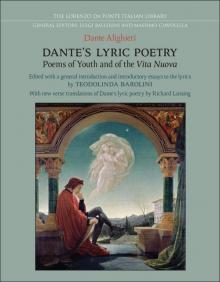 Dante's Lyric Poetry
Dante's Lyric Poetry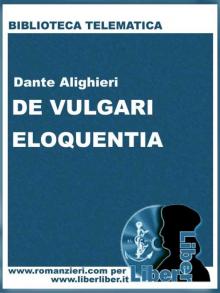 De vulgari eloquentia
De vulgari eloquentia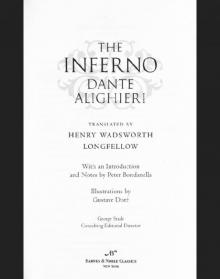 The Inferno (Barnes & Noble Classics Series)
The Inferno (Barnes & Noble Classics Series)